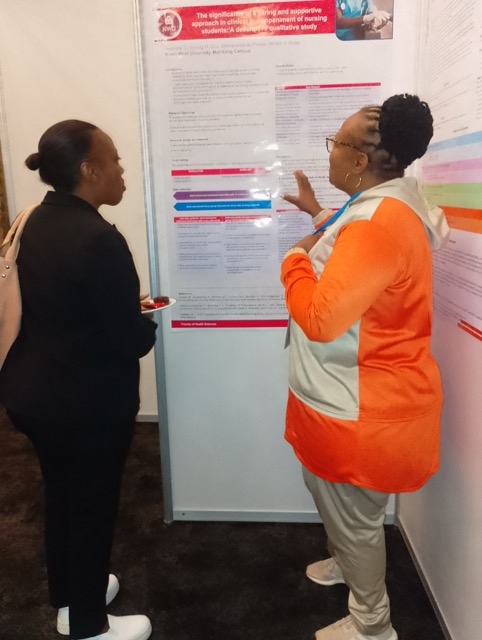Primary Healthcare (PHC) originated in the 1978 Declaration of Alma-Ata to the 2018 Declaration of Astana. The rejuvenation of PHC has been a key priority for countries worldwide towards universal health coverage (WHO, 2024). The National Health Strategic Plan 2023-2028 seeks to achieve health for all through people-centred, comprehensive, and equitable healthcare that prioritises prevention, health promotion, and community participation.
The plan aims to strengthen community-based services and create an integrated, efficient health system to strengthen universal access to high-quality, affordable, and equitable healthcare in South Africa. This includes lowering disease burdens, supporting health systems, and attaining universal health coverage to guarantee healthy lives and advance well-being for all South Africans. The emerging trend in (PHC) delivery is the integration of compassion into PHC practice. Compassionate PHC has been regarded as the cornerstone and driver of the PHC approach. The trend inspires the PHC staff to provide care daily and can catalyse action aimed at the future to shift health systems back towards PHC.

To prepare nurses to handle the current and upcoming health care challenges according to the PHC re-engineering, the South African Nursing Council (SANC) phased out outdated nursing qualifications to introduce new ones in accordance with the Nursing Act 33 of 2005. Recently, a postgraduate diploma/degree in nursing management is required for managers, and a postgraduate diploma/degree in nursing education is required for a clinical educator/lecturer, according to SANC's requirements. A clinical specialisation qualification, such as Primary Care Nursing, Trauma/Intensive Care, etc, is required of professional nurses working in specialised units.
The School of Nursing at the North-West University initiated advanced nursing education programmes (Postgraduate diplomas, master’s degrees, and doctoral studies) intended to enhance nurses' clinical expertise, leadership, and research capabilities beyond the fundamentals of professional nursing. Strengthening health systems, encouraging innovation, quality improvement, and patient-centred care in PHC settings all depend on advanced nursing education. These nursing programs address changing healthcare concerns in a variety of dynamic circumstances, and allow nurses to mentor future practitioners, influence change, and cultivate leadership and professional autonomy.

Current Challenges in Primary Healthcare and the role of advanced nursing education
Among the many issues facing PHC are a lack of human and material resources, rising rates of communicable and non-communicable diseases, unequal access to care, poor infrastructure, and a high number of undocumented foreign nationals accessing healthcare. In this sense, advanced nursing education is essential because it gives nurses the clinical, leadership, and research abilities they need to improve the standard and accessibility of care. Advanced training enables nurses to take on more responsibilities in diagnosis, management, health promotion, and policy creation, supporting patient-centred, evidence-based care and long-lasting PHC systems.
How the Postgraduate Diploma in Nursing empowers nurses to take on leadership and specialist roles
Through the development of their clinical knowledge, critical thinking, and decision-making abilities, the Postgraduate Diploma in Nursing equips nurses to assume leadership and specialised responsibilities. The curriculum prepares nurses to efficiently handle complex healthcare concerns by imparting advanced knowledge in areas like health policy, management, research, and evidence-based practice. With the qualification, nurses gain the skills necessary to manage healthcare programs, lead teams, and have an impact on policy in a variety of healthcare environments. Additionally, it allows them to specialise in areas like community nursing, mental health, or PHC, which enhances the quality and effectiveness of patient treatment. The postgraduate diploma enhances nurses' ability to work independently as practitioners and change agents who significantly improve healthcare systems.

The potential impact of postgraduate nurses on communities and healthcare systems
Nurses with postgraduate training have the capacity to significantly influence healthcare systems and communities. They can provide excellent, evidence-based treatment that enhances patient outcomes and fosters community well-being because of their superior knowledge and abilities. The burden of diseases can be decreased by empowering clients and communities to adopt healthy lifestyles through the leadership of health promotion and disease prevention efforts. Postgraduate nurses can increase service delivery in healthcare systems through clinical knowledge, efficient administration, and quality-improvement programs. To reach set targets of indicators according to regional health requirements, they can support research and innovation. In general, postgraduate nurses can promote fair and patient-centred care at the community level while strengthening health systems by encouraging accessibility, efficiency, and sustainability.
Advice for nurses considering postgraduate studies
Nurses who are thinking about pursuing postgraduate education should carefully assess their interests, career aspirations, and the contribution they hope to make to the healthcare industry. Whether it's in clinical specialisation, education, management, or research, they should pick a curriculum that fits with their career goals. Being ready for the time and academic demands that come with juggling employment, personal obligations, and studies is also crucial, including seeking mentors who can offer support. Nurses should see postgraduate studies as a chance for leadership development, professional advancement, and a way to help build the health system and provide better patient care, rather than just as a credential. The studies give nurses the ability to broaden their areas of practice and promote constructive change in the nursing field and the larger healthcare industry.

Although PHC continues to be the foundation of successful health systems, it faces persistent challenges that limit its potential impact. Enhancing clinical competency, leadership, research capacity, and system-level innovation are all made possible by advanced nursing education, which is a major force behind change. For PHC systems to be resilient, equitable, and sustainable, nurses must be empowered through advanced nursing education.



